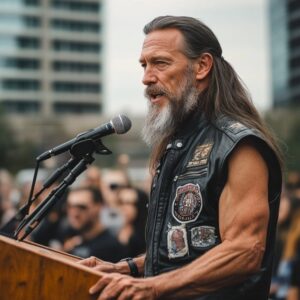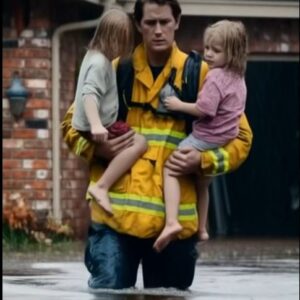
Nobody ever told me the real name of the gray-bearded biker who saved my son. Everyone in town called him Bear. I first spotted him outside the VA hospital. With his scarred leather jacket, mirrored shades, and knee-length white beard, he looked like Santa if Santa rode a Harley. He was hugging a golden-retriever pup against his chest, and that tiny dog was the first thing to pull my son’s gaze away from the ground since an IED blast in Afghanistan took both his legs.
I pushed James’s wheelchair closer, hoping the pup might coax a smile. Before I could ask the biker about the dog, three security guards hurried over.
“Sir, we’ve told you—no asking vets for money on hospital grounds,” one guard warned, thumb hovering near his radio. Bear didn’t argue. He dipped his head toward my son, a silent nod only another soldier would understand, then walked off.
James did not speak again until night. Around two a.m. he whispered, “Mom, I need to find that biker with the puppy. He trains service dogs for vets like me, but the VA drove him away because they think he’s just some crazy old man.”
I had no clue then how that chance meeting would flip our world. I did not know that Bear had already prepared more than sixty service dogs for veterans who could never pay the $30,000 most programs charge. He ran everything from a shed behind a motorcycle repair shop, paying costs with his Social Security and a few dollars earned fixing bikes.
Three days later my car overheated on the edge of town. The local mechanic was swamped but promised he knew someone quick with tools.
“Old fellow named Bear,” he said. “Works out back of my cousin’s bike shop. Looks rough but he’s pure gold.”
Twenty minutes later I rolled up to a faded workshop wrapped in rows of half-rebuilt motorcycles. Through the open door I saw a big man with a white beard guiding a puppy to pick a set of keys off the floor.
“Excuse me,” I called. “Are you Bear? Were you at the VA with the dogs?”
He eyed me, cautious. “Depends who’s asking.”
“My son is James Mercer, Marine, double amputee. He saw you and wants to talk about your dogs.”
Bear studied me, then pointed at the pup. “This little guy’s Scout—eighth generation from my own breeding line. Smart, gentle, brave.” His voice sounded like gravel rolling in a tin can, but it grew soft around the puppy. “Got twenty-three more in training.”
“The VA said you were begging,” I admitted.
A low chuckle rumbled from his chest. “Begging? I was dropping off three finished dogs. The administrators shut my program down last year—they decided a biker couldn’t make ‘real’ service animals.”
He tapped his beard. “Forty years training military K-9s, yet they branded me a fake because I look like an outlaw.”
My heart ached. James hadn’t shown interest in anything for months, not therapy, not visitors. Seeing Bear’s pup had met a spark inside him. “Would you meet my son?” I asked. “I believe one of your dogs could help him.”
Bear’s weather-lined face hardly moved, but I caught a flicker in his eyes. “Helping soldiers is why I keep breathing. Understand, though—this isn’t charity. It’s a mission.”
“Bring coffee. Black.”
The next morning Bear pulled up to our curb on a spotless Harley with a custom sidecar for pups. The engine’s thunder drew James to the window for the first time in ages.
James wheeled onto the porch as Bear lifted two goldens from the sidecar. Those thick, tattooed hands held the animals like precious glass. Bear spoke to them in a soft whisper that felt completely opposite his wild appearance.
“So you’re the Marine,” Bear said—no pity, no baby talk, just respect.
“Two tours,” James replied. “Afghanistan. The last one … well, you see.”
Bear nodded. “Vietnam here. Doc said I’d never stand again.” He shrugged, as if to say proved them wrong. He set the pups down. “Scout here is keen on PTSD alerts. Ranger’s more into mobility work.”
James reached toward Scout. The puppy padded up to the metal footrests, unfazed by the chair, tail wagging.
“How much for him?” James asked.
Bear shook his head. “I don’t sell dogs. I pair warriors with partners and train them together. Takes about a year. A dog’s no instant cure—he’s a teammate.” He locked eyes with James. “You ready for hard work?”
For the first time in months, I saw fire in my child’s face. “Whatever it takes.”
“Then be at my place tomorrow. 0800. Bring coffee, black. No sugar. I’ll handle the rest.”
Before he left, I asked, “Why do you cover all the costs yourself?”
Bear’s blue eyes, bright under a grease-stained cap, softened. “When I got back from ’Nam, nobody cared if we lived or died. Found a stray mutt when I was living in my car. That dog kept me alive. Now I pay the debt forward. Simple as that.”
He secured Ranger in the sidecar and roared away, Scout curling into James’s lap. My boy whispered, “Mom, maybe I’ll be okay.”
For the first time in forever I believed him.
Red tape and roadblocks
But good news hides trouble. Bear’s workshop faced shutdown. The VA had rejected his certification requests three times. County zoning said no animal training on that site. Rent was three months late.
The next day I drove James to training. Behind Miller’s Bike Repair stood a yard alive with vets in wheelchairs or on prosthetic limbs, each guiding a dog. Bear floated among them like a quiet general—soft word here, gentle correction there.
Then a black SUV rolled up. Two suited men marched over. “Mr. Harrison”—the first time I’d heard Bear’s real last name—“this property isn’t zoned for animal training. You have thirty days to cease operations.”
“These animals are medical aids under ADA law,” Bear argued.
“Not without proper certification,” they replied. They quoted a cost so high I felt my stomach drop.
Veterans gathered around us, telling stories: a seizure alert, night-terror relief, saved lives. The officials shrugged. “Anecdotes aren’t proof.”
I stepped in. “What do you need for him to keep helping soldiers?”
“Upgraded facilities, oversight, insurance, licensed trainer credentials,” they said and drove off.
Bear’s shoulders sagged for a heartbeat. That’s when I promised: “Give me two weeks. I used to edit investigative articles. I can raise awareness.”
He gave a tiny nod. “Two weeks. Don’t expect miracles. Most folks decide who I am the moment they see leather and a beard.” He wasn’t wrong.
Cameras, posts, and empty clicks
I snapped photos, filmed sessions, gathered every success story. I built a website, launched social channels, called reporters. Some outlets wanted a quirky “biker with puppies” bit; few cared about real impact. Donations trickled but not enough.
Time raced. The thirty-day clock ticked down.
Then the flood hit.
A sudden storm turned streets into rivers; the VA hospital flooded. Ambulances stalled in high water. Staff shouted for help. At three a.m. James called: “Bear’s mobilizing the crew. We’re heading in.”
I followed. Knee-deep water greeted me at the entrance. Bear barked orders like a sergeant. Dogs carried medical kits in waterproof vests. Vets steadied patients on crutches, wheeled gurneys through dark halls, guided the frightened with gentle noses.
I filmed everything: dogs leading blind patients, alerting to panic attacks, retrieving oxygen tanks. By sunrise they’d evacuated sixty-eight people safely. National Guard arrived to find the worst already handled.
The VA director, drenched and shaking, grasped Bear’s hand. “I was wrong. Your program is incredible. I’ll personally back your certification.”
Bear only muttered, “Shouldn’t have taken a disaster to make you see.”
Viral at last
My flood footage went viral. A crowdfunding page ballooned past $100,000 in two days. A veterans’ foundation offered land for a real facility. County officials backtracked on zoning threats. Bear grumbled at the fuss, but paperwork finally turned in his favor.
Six months later the William “Bear” Harrison Service Dog Center opened. Modern kennels, training yards, classrooms—yet Bear insisted the old shed stay intact “so pups remember humble beginnings.” Vets from five wars attended the ribbon cutting, dogs by their sides.
Reporters begged Bear for quotes. He said, “These dogs save lives. These vets saved the rest of us. My job is to connect them.” Nothing more.
Purpose over praise
That evening we hosted a quiet cookout. I found Bear on the porch watching James demo Scout’s skills for neighborhood kids. Scout fetched dropped toys, braced James during transfers, nudged his hand when anxiety crept in. Laughter filled the yard—sound I thought we’d lost forever.
“You gave James his life back,” I told Bear.
He shook his head. “He walked the hard road himself. Scout’s just a compass.”
“Why never slow down?” I asked. “You could retire now.”
Bear drummed fingers on his coffee cup. “If I stop, shadows creep in. Training dogs keeps them out.” He glanced at my son. “Watching that—worth more than rest.”
Before leaving, Bear told James, “Public-bus lesson at 0700. Don’t be late.” My son saluted playfully.
I walked Bear to his bike. He looked the same as the day we met—leather, tattoos, wild beard—but now I saw depth instead of danger.
“Thank you,” I said. “I misjudged you once.”
“Lots do,” he replied. “Sometimes that’s fine. Keeps the wrong folks away.” He secured a puppy carrier, kicked the starter, and rumbled into the night. “Remember, rough edges often hide the softest hearts.”
Inside, Scout curled by James’s bed. My son laid a hand on the dog’s warm fur and drifted to peaceful sleep, dreams guarded by a golden sentinel.
And I thought about how easily we label people: biker, outlaw, misfit. How many heroes do we overlook because they don’t fit our idea of what a hero should be?
Bear never sought medals or applause. He just kept doing the work—using loyal dogs to patch wounds no medicine can reach. In giving broken soldiers a new mission, he also healed the hidden wounds within himself.
Sometimes hope rides up on a loud bike, wearing old leather and a snow-white beard, cradling a puppy like a priceless treasure. And if we look past the surface, we might find salvation in the most unexpected arms.





